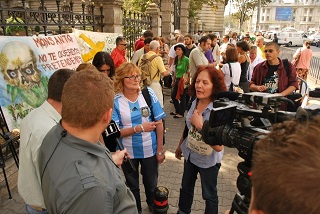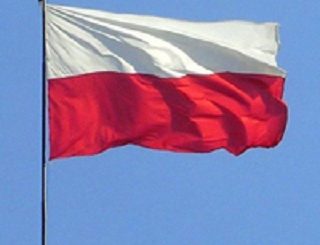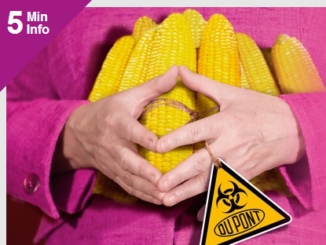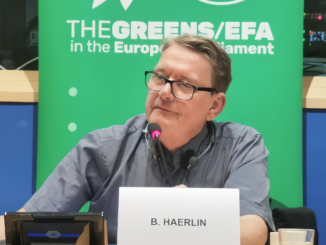
Sofia Gatica is the co-founder of the Mothers of Ituzaingó – a group of 16 mothers working together to put a stop to the indiscriminate agrochemical use that is poisoning their community. What the women ultimately want to see is the introduction of a total ban. In their district of Ituzaingó in Cordoba, their work takes considerable courage. However, despite threatening visits from the ‘Pistoleros’, they have remained persistent. Earlier this year, Sofia was awarded the Goldman Environmental Prize for her work, and resistance is beginning to grow. In August this year, for the first time, two agricultural companies and an aircraft operator were brought to court for violating security rules.
Their findings and experiences are consistent with scientific studies carried out in Argentina and in France which confirm that Glyphosate is toxic for embryos. In Europe, alarming concentrations of Glyphosate can be detected in the urine of citizens. Its use is being increasing associated with problems in animal husbandry. Nonetheless, the safety review of the world’s best-selling herbicide that is due in Europe has been postponed by three years, and the maximum allowable quantities of the plant toxin in feed and food have been increased.
The European Food Safety Agency (EFSA) has also positively evaluated an application by Monsanto to cultivate Roundup-ready GM soya in the EU, stating that the genetic modification of plants presents no additional health or environmental hazards. The impact of the system of herbicides and genetically engineered plants as a whole remains unevaluated.
Mothers of Ituzaingó European Speakers Tour

Sofia Gatica and Maria del Milagro Godoy spoke about their experiences at this year’s GMO Free Europe conference, which took place on 5th September in Brussels. After all, most of the Roundup-sprayed GM soya which is grown in their country ends up as animal feed in Europe: The production of cheap, industrial meat in European factories depends on the import of millions of tons of GM soya from North and South America. Following this event, they travelled to Romania, Spain, Germany and Poland as part of a Speakers Tour organised by ARC2020.
On 19th September,they were in Brussels for the final day of the “Good Food March” – a European-wide event calling for good local food and small-scale, organic farming in the EU. As the cultivation of leguminous plants in the EU will improve soil fertility, promote biodiversity through crop rotation and reduce the use of fertilizers, it must be promoted in the wake of the EU agricultural reform. This would not only be good for farmers in Europe, but also for the remaining small farmers in Latin America, and their health.
Below you can find videos from the tour:





